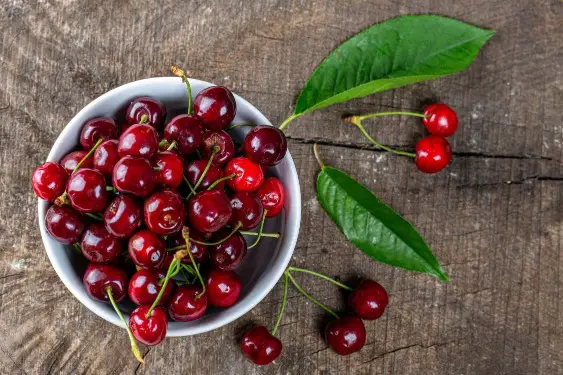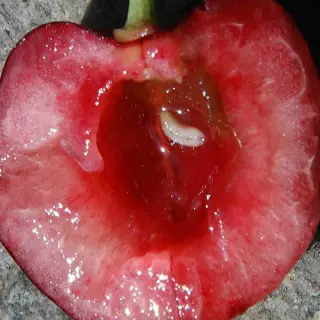Sweet, juicy cherries are a delicious summertime treat.
When it comes to picking up fresh cherries at the grocery store, how do you know how to properly store and clean them? Once you’ve got them home, what’s the best way to keep them tasty until you’re ready to eat them?
Check out our guide for all of the answers!
Contents
How Do You Properly Clean Cherries?
Here is the step-by-step guide to clean cherries:
- Step 1: Rinse the cherries under cold water. This will help remove any dirt or debris that may be on the surface of the fruit.
- Step 2: Place the cherries in a colander and gently rub them with your hands to loosen any remaining dirt.
- Step 3: Spread the cherries out on a clean towel and pat them dry.
- Step 4: Remove the stems from the cherries. You can do this by using a paring knife or by simply pulling them off with your fingers.
- Step 5: Pit the cherries, if desired. To do this, cut the cherry in half around the pit and then twist the two halves in opposite directions to separate them. Alternatively, you can use a cherry pitter tool to remove the pit without cutting the fruit in half.
How Long Should You Soak the Fruit in Vinegar?
Here’s a short guide on how long you should soak the fruit in vinegar:
1. Soak Time Depends on The Type of Fruit
The answer to this question depends on the type of fruit you’re soaking.
For example, thinner-skinned fruits like berries can be soaked for as little as 15 minutes, while thicker-skinned fruits like apples and pears will need to soak for longer, up to an hour.
2. The Temperature of The Vinegar Also Matters
In addition to the type of fruit you’re soaking, the temperature of the vinegar also matters.
If you’re using cold vinegar, you’ll need to soak the fruit for a longer period of time than if you’re using hot vinegar.
Soaking times for cold vinegar range from 30 minutes to overnight, while soaking times for hot vinegar range from 15 minutes to an hour.
Should You Wash Cherries Before Eating?
The skins of cherries are very thin, which means they can absorb pesticides and other chemicals easily.
Pesticides are used on many fruits and vegetables to protect them from pests, but these chemicals can be harmful to humans if consumed in large quantities.

Washing your cherries helps to remove these harmful chemicals and makes them safer to eat.
In addition to removing harmful chemicals, washing your cherries also helps to remove dirt and other debris that may be on the surface of the fruit.
Cherries are often grown in dusty conditions, so it’s not uncommon for them to have a bit of dirt on their skin. A quick rinse under the tap will help to remove this dirt and make them more pleasant to eat.
Finally, washing your cherries can also help to prolong their shelf life. Cherries are delicate fruits and are prone to molding if they’re not stored properly. If you wash your cherries before storing them in the fridge, they’ll stay fresh for longer.
What Is the Best Way to Clean Fresh Cherries?
Here are a few tips on the best way to clean fresh cherries.
- Rinse the cherries under cool water. This will remove any dirt or debris that may be on the surface of the fruit.
- Remove the stem and leaves from each cherry. You can do this by gently twisting the stem until it comes off in your hand. If there is any remaining stem or leaf attached to the fruit, you can use a small paring knife to remove it.
- Place the cherries in a colander and give them a final rinse under cool water.
- Pat the cherries dry with a clean towel or paper towel before eating or using in a recipe.
- With these simple tips, you can easily clean fresh cherries so that they’re ready to eat or use in your favorite recipes. Enjoy!
Does Cleaning Fruit With Vinegar Work?
Yes, cleaning fruit with vinegar can be an effective way to remove dirt and debris, as well as pesticides that may be present.
It is important to note, however, that you should only use plain white or apple cider vinegar for this purpose—not flavored vinegar or other types of vinegar.
Additionally, it is important to make sure the vinegar is diluted with an equal amount of water before using it on your fruit.
Finally, while vinegar can help to remove some of the dirt and debris from the surface of the fruit, it cannot penetrate the skin.
Therefore, you should always scrub fruits with thick skins like apples and pears under cool running water before consuming them.
Cleaning fruit with vinegar can be a simple and effective way to ensure that your fruit is safe to eat. It’s important to keep in mind, however, that the soak time and temperature of the vinegar may vary depending on the type of fruit you’re soaking.
You can also clean fruit with baking soda.
How Long Do You Let Berries Soak in Vinegar?
The amount of time you need to let your berries soak in vinegar will depend on the type and temperature of the vinegar.
If you’re using cold vinegar, you’ll need to soak the fruit for a longer period of time than if you’re using hot vinegar. Soaking times for cold vinegar range from 30 minutes to overnight, while soaking times for hot vinegar range from 10 minutes to about an hour.
It is important not to leave the fruit in the vinegar for too long, as this could cause it to become overly soggy or even start to lose its flavor.
If you’re unsure how long your berries should soak, you can always do a test batch and check their texture after a set amount of time.
Once you know the appropriate soaking time for your particular type and temperature of vinegar, you can use this information to ensure that your berries are clean and safe to eat.
How Do You Sanitize Fresh Fruit?
Sanitizing fresh fruit is an important part of ensuring that it’s safe to eat. The most effective way to do this is by washing the fruit with a combination of water and vinegar.
- To sanitize your fruit, mix one part white or apple cider vinegar with three parts cold water in a large bowl or container.
- Place the fresh fruit in the mixture and let it soak for 5-10 minutes. Drain off the vinegar solution and rinse the fruit with cold running water.
It is important to know that this method will not remove pesticides, so if you’re concerned about pesticide residues on your produce, you should always buy organic when possible.
What Happens if You Eat Unwashed Cherries?
Eating unwashed cherries can pose several risks.
For starters, it is likely that there will be dirt, debris, and airborne bacteria on the fruit which could make you sick.
Additionally, some fruits may have pesticide residues which can also be a health risk if not removed properly.
If you do eat unwashed cherries, you should be sure to check them carefully for any visible dirt or debris and wash them thoroughly in cool running water before eating.
Which Fruit Should Be Eaten Without Washing?
There are some fruits that can be eaten without washing.
Fruits with thick skins, such as bananas and avocados, do not need to be washed as the skin provides a protective layer against bacteria and dirt.
Additionally, most citrus fruits like oranges and limes should also be fine if you do not wash them due to their thick rinds.
However, it is important to note that these fruits can still be contaminated by bacteria from the environment or from handling, so it is best to wash them before consuming if possible.
You should always discard any fruit which has visible signs of mold or decay.
How Do You Store Cherries?
Cherries are delicate fruit that can easily be damaged if not stored properly. To ensure that your cherries stay fresh and delicious, you should store them in the refrigerator at temperatures between 32-36 degrees Fahrenheit.
If you have a crisper drawer, this is the best place to store cherries as it helps keep them slightly dry and at a consistent temperature.
If your cherries are unripe, they should not be stored in the refrigerator as this will cause them to become over-ripe and mushy.
Instead, store them at room temperature in an area that is away from direct sunlight and moisture.
It is also important to note that cherries should be consumed within a few days of purchase for the best flavor and texture.
If you are unable to consume them all within this time frame, you can store cherries in an airtight container or bag in the freezer for up to several months.
Are Cherries High in Pesticides?
Cherries are generally not a high pesticide residue crop, however, it is important to note that some conventional cherries may contain residues of certain pesticides.
If you are concerned about the presence of pesticide residues on your produce, it is best to buy organic fruit whenever possible.
Are Store-Bought Cherries Washed?
Most store-bought cherries have not been washed, so it is important to wash them thoroughly before consumption.
Additionally, some fruits may have pesticide residues which can also be a health risk if not removed properly.
To ensure that your cherries are safe and free from dirt, debris, and harmful chemicals, it is best to wash them thoroughly in cool running water before eating.
If you’re concerned about pesticide residues, it is best to buy organic fruit whenever possible.
How Do I Know if My Cherries Have Worms?
If you see small, white worms on or near your cherries, they likely have been infested by cherry fruitworms. These pests feed on the fruit and can cause it to become unappetizing.

Fortunately, cherry fruitworms are usually easy to spot as they are typically visible in the center of the cherry or near the stem.
To check if your cherries have worms, inspect the fruit carefully before consuming and discard any that appear to be infested.
Can You Get Tapeworms From Unwashed Fruit?
It is possible to get tapeworms from eating unwashed fruit, but this is rare.
Tapeworms are parasites that can live in the intestines of certain animals, and humans can become infected if they accidentally consume food or water which contains tapeworm eggs or larvae.
Although infection from eating unwashed fruit is rare, it is best to always wash your produce thoroughly before eating in order to reduce the risk of infection from parasites.
What Happens if You Accidentally Eat Fruit Worms?
If you accidentally eat a fruit worm, there is usually no need to be concerned as the worm can easily pass through your digestive system without causing any harm.
However, it is important to wash all fruit thoroughly before consuming and discard any that appear to be infested with worms in order to reduce the risk of infection from parasites.
Conclusion:
Washing your cherries is a good idea for several reasons. It helps to remove harmful chemicals and pesticides, it removes dirt and debris, and it helps to prolong the shelf life of the fruit.
The next time you find yourself with some overripe fruit, don’t despair! Soaking the fruit in vinegar is a great way to make it last longer.
Just remember that the type of fruit and the temperature of the vinegar will affect how long you need to soak the fruit. With that in mind, you can tailor your soaking time to fit your specific needs.
However, it’s important to remember that vinegar cannot penetrate thick-skinned fruits like apples and pears, so these should be scrubbed under cool running water before consuming them. Thanks for reading!
Amazon and the Amazon logo are trademarks of Amazon.com, Inc, or its affiliates.

